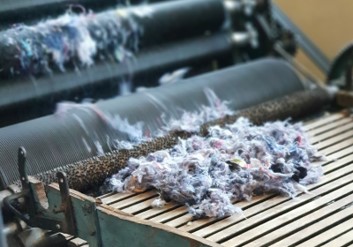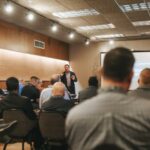
- Kim Kisner
- Community
- 03/07/2023
EGLE Strategy Includes Recycling Partnerships with a NextCycle Initiative

The Department of Environment, Great Lakes and Energy (EGLE) is working to grow a Michigan circular economy through recycling. Matt Flechter, recycling market development specialist at EGLE, says recycling programs in Michigan involve building a strong supply chain so the valuable commodities that businesses need make their way from the curb to new products.
SBN Detroit spoke to Flechter to find out more.
Q: Tell me about your role when it comes to recycling.
A: For the past 22 years, I’ve been working toward the goal of helping Michigan regain a leadership position in recycling.
I work for the Department of Environment, Great Lakes and Energy (EGLE), and my role is focused on recycling market development. This essentially means making sure there is a process in place for the materials that are put into dumpsters by manufacturers and businesses to make their way into sorted waste materials and then into reproduction, ultimately to make new products that are developed in Michigan.
This sounds straightforward in its most basic terms, but recycling is a complex system.
It takes motivated individuals to know that there is a better use for the materials that are being disposed of. It takes investing in the collection and hauling of materials. It takes reproduction and remanufacturing, and it takes having a market: end users that then purchase and/or use those materials.
The last piece of this complex puzzle is ensuring that there are entities in place for each part of the cycle – and that they are connected – creating a fully functional closed-loop supply chain.

Q: What are the biggest challenges?
A: Recycling markets are diverse. Materials consist of plastic, paper, organics, and glass, and each has its own supply chain. Some have ready-made markets. Corrugated cardboard is an example here, as it can be bailed and sent to paper manufacturers for reuse. Finding markets to create a demand pull for a material like glass is more challenging.
Another challenge is the geographic location of the manufacturers involved in the reproduction because transportation of materials can get costly.
Also, many of these end markets are startups, and they need support and innovation, and new uses to create demand-pull. Good examples of these are Pivot Materials and NexTiles.
For all of this to work, and for manufacturers and businesses to move from the use of non-recycled materials to recycled materials, there must be a consistent supply of these materials.
So, the supply chains we are building need to be closed-loop, local, and robust.
Q: How do EGLE and NextCycle Help?
A: To address each part of the cycle I described, EGLE created NextCycle, and we collaborate with partners such as Centrepolis, Michigan Recycling Coalition, and Resource Recycling Systems, a global consultancy.
We have made amazing strides in the last couple of years – with momentum coming from our NextCycle initiative.
NextCycle is an incubator and accelerator and is designed to connect entrepreneurs, companies, organizations, and communities to technical support, financial resources, and capacity building for recycling, recovery, and reuse initiatives.

If someone comes to us with a new idea, that company first applies to one of the NextCycle challenge tracks. There are five challenge tracks: Roads, Public Sector, Recycling Supply Chain Solutions, Organics Solutions, New Innovations, and Technology.
They are then selected into a cohort or a team and we provide several areas of support, including technical assistance, research data, business development, funding opportunities, an extensive network, customized mentorship, and more to help get the idea to the next level.
We have worked with over 60 teams, and it’s an exciting time when it comes to recycling.
Q: How so?
A: We are seeing a resurgence and interest in making sure Michigan has a strong circular economy, primarily because there are new people at the table focused on climate goals and deciding how they are going to tell their businesses’ sustainability story.
Historically waste and recycling have been seen as an afterthought – we have a problem and now need to fix it. Businesses today are starting to look at fixing the problem before it’s created, which is a big paradigm shift that’s exciting.
There is a lot of growth in this sector and there are threads of it in every business in Southeast Michigan. Every business is faced with choices and options to address the triple bottom line.
This is also creating new business opportunities.
There are broader-based coalitions working to expand recycling access, such as the Polypropylene Coalition and the Food Service Packaging Institute.
There are also new people looking to fund. No longer is it just the government growing the recycling system.
This increased participation and the growth of the end markets are exactly what is needed for success.
Q: What Southeast Michigan businesses are you working with?
A: I can give a few examples here.
On the collection side, Pink Elephant Events provides zero-waste event services and waste diversion to the events industry, businesses, and nonprofits in Southeastern Michigan. They collect products for reuse, then calculate the impact, so that the business having the event can show a tangible “win’ toward their sustainability goals.
An example on the processing side is Glacier. This California-based company identified Michigan as the best place to invest in deploying its innovative robotics technology. We connected them to two materials recycling facilities (MRF)s in Michigan to do so – SOCRRA in Troy and RRRASOC in Southfield – and provided grant funding.
An example of end-use is Industrial Sewing and Innovation Center (ISAIC). We helped them to secure funding for equipment to more efficiently turn waste textiles into new products.
We are starting to see a truly circular economy forming. The new businesses are feeding off of each other and multiplying.
Q: Where does your passion come from?
A: There is a huge amount of work to be done in recycling, but it’s a labor of love. I can see the growth potential now. There is funding to grow markets and that has created a clear process and unleashed the potential. Before there was funding from the state, people were talking about the problem but needed funding to fix it. We had gaps in the supply chain. Now we are starting to fill those gaps and there is a defined process.
We are hitting an important point in recycling market development that is now attracting the attention of partners nationally. People are seeing Michigan as the place to grow and invest. We are gaining momentum.
It’s exciting for me to have colleagues in other states who are looking to Michigan to see how we are doing it.
Again, it has always been my goal to return Michigan to a leadership position and we are getting there. People are paying attention and seeing the state as one that’s an important leader in a circular economy
Q: What advice do you have for businesses in Southeast Michigan that may want to partner with you or contribute to your efforts here?
A: Go to the NextCycle page and get involved.
There are microgrants available for small and defined projects to help businesses get them to the next step up the sustainability ladder.
Or if you are ready to launch or commercialize technology you may be a candidate for a team to be selected into a track.
On a more practical note, I tell people to go look in their dumpsters. Spend time understanding what is being thrown away and how you can divert it.
Identify a person in your business to take the lead.
Third, think about your sustainability story. It’s not about recycling for the sake of recycling. Your business can be part of the climate solution and what are we doing to make sure we are making the least possible impact by connecting markets, using recycled content, and recycling our waste material.
Also note – all are welcome at the upcoming NextCycle Michigan Pitch Event on Thursday, April 20, 2023, from 10 a.m.-4 p.m. at the TechTown Detroit Industry Innovation Center. The event will showcase 15 teams pitching their businesses and projects as part of the Recycling Innovation Technology (RIT) and Foods, Liquids, & Organic Waste Solutions (FLOWS) Challenge Innovation tracks. Register at this link.
Be sure to subscribe to our newsletter for regular updates on sustainable business practices in and around Detroit.
Kim Kisner
- All
- Business
- Community
- Education
- Events

Unique Monique Scented Candles, a Detroit-based business founded by Monique Bounds., aims to produce candles and household products with clean ingredients and local supply chains. What began as a personal hobby during college has evolved into a full-time venture producing coconut oil and soy-based candles made with essential oils and locally sourced materials. SBN Detroit interviewed Bounds about launching a sustainable product line, sourcing challenges in Michigan, and...

Eastern Market Partnership, in collaboration with the City of Detroit’s Office of Sustainability Urban Agriculture Division, has announced $240,000 in grant funding to support Detroit-based farmers and farmer collectives. The grants will advance food access, climate education, sustainable land use, and economic opportunity, with priority given to Black- and Indigenous-led farms, youth-led initiatives, and projects rooted in historically disinvested neighborhoods. The recipients – ranging from cooperatives and community...

Citizen Robotics is a Detroit-based nonprofit that advances the use of robotics and digital manufacturing in residential construction, focusing on improving productivity, sustainability, and long-term affordability. Best known for its early work in 3D-printed housing, it explores how alternative construction methods and new financial models can reduce material waste, lower lifetime operating costs, and enhance the resilience of homes. SBN Detroit interviewed Tom Woodman, founder and president of...







